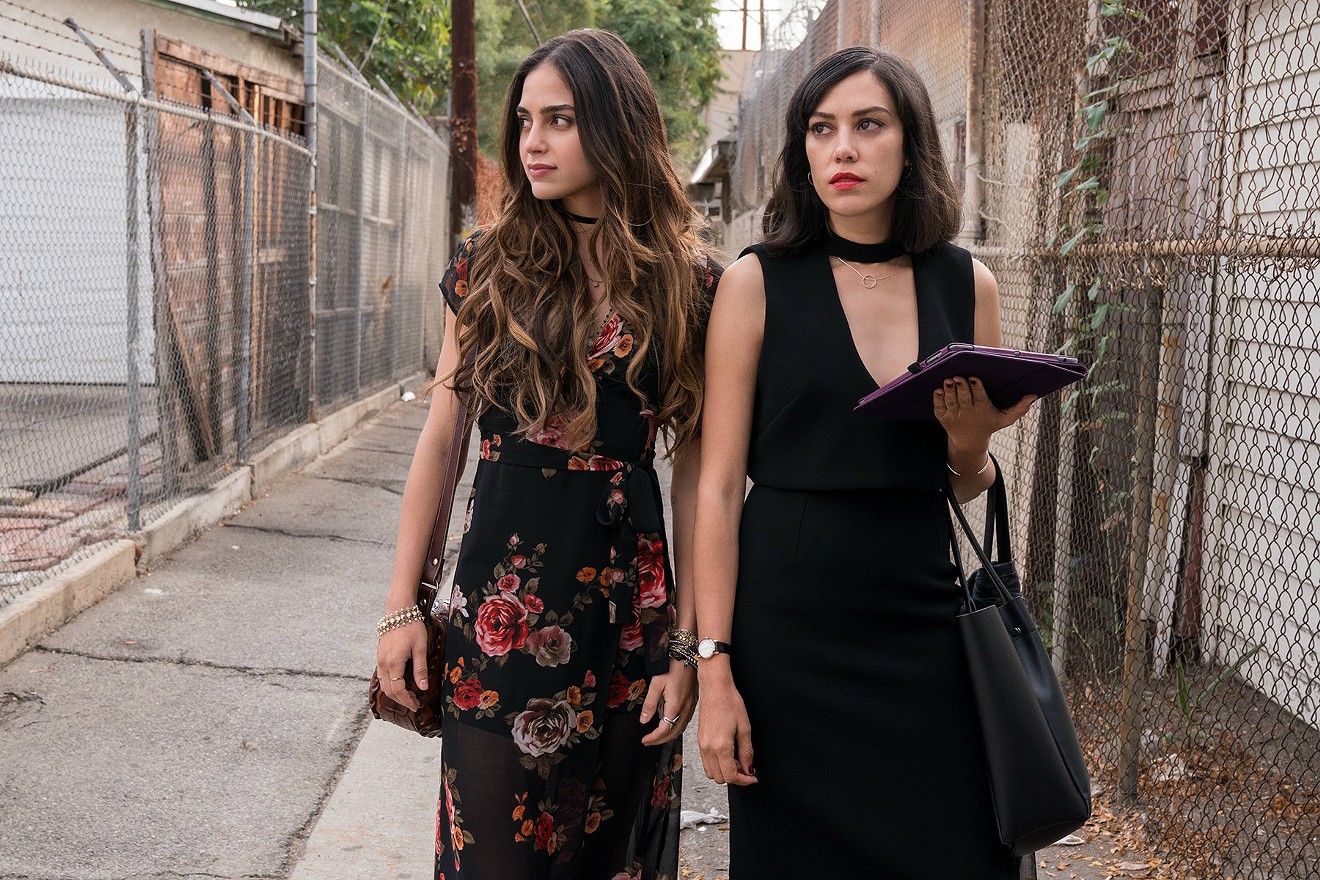Vida premieres May 6 on Starz.
Los Angeles as a location in film and television is often either a default “nothing” everyplace or a city solely inhabited by movie stars. That representation perpetuates the false belief that this bustling hub of commerce possesses no intrinsic culture, no valuable history. Outsiders have difficulty seeing the city as anything but a cheap movie set, and the artists and filmmakers who move there have a reputation for distancing themselves from civic engagement or responsibility. So it is absolutely refreshing that creator Tanya Saracho’s Vida, a Starz drama about two sisters returning home to a rapidly gentrifying Boyle Heights, portrays Los Angeles as a messy, complex community struggling with identity as it works through which vestiges of the past to cast off and which to tightly embrace. Told through the unique lens of this Latinx family, Vida is a statement on upward mobility and the privilege of being able to outgrow your home.
Saracho and company go for broke in the pilot, which, at a slim thirty minutes, miraculously touches on sexism, colorism, gentrification, adultery, religion, homophobia, classism and the tendency of some political bros to indulge in misogyny while claiming they stand for progress. Those of-the-moment topics materialize in the story organically, through characters in conflict.
Emma (Mishel Prada) arrives from Chicago just in time for her mother Vida’s memorial service at their family’s working-class neighborhood bar. Emma’s a sore thumb, a prim and proper businesswoman who looks as though she’s spent her entire life trying to forget this was once her home; the barrage of texts she’s getting from co-workers suggests only part of her is actually there. At her mother’s apartment above the bar, she’s met immediately by her naive, vain sister Lyn (Melissa Barrera), who has also returned for the funeral, and her mother’s queer “roommate” Eddy (Ser Anzoategui, who goes by they/their pronouns in real life but she/her predominantly in the show).
It’s not a spoiler to say that it turns out Vida was gay, as viewers will get this right away, but watching the sisters come to this realization is a painful experience. They’re so disconnected, so full of anger and confusion, that they don’t see how greatly Eddy is grieving or wonder exactly why that is. They’ve missed the truth of the most important relationship in their mother’s life. That Emma is gay herself and never felt accepted complicates the situation. Anzoategui’s performance as Eddy while Emma and Lyn come to this realization is a knockout. Eddy sleepwalks through her grief, secretly downing mezcal after mezcal until she breaks down in the kind of sloppy tears that look like they could infect us with despair just from watching.
Despite the show’s intense focus on character, however, the crux of the issues Vida explores lies, surprisingly, in property, specifically that family bar: The business has been losing money, is split three ways (between Emma, Lyn and Eddy), and is home to multiple undocumented renters living upstairs. Big choices must be made. Sell to developers to get out of a predatory loan? Shine up the bar’s image to attract a wealthier/hipper clientele? No option is good. If they sell, they’re displacing a bunch of people who couldn’t legally rent from anyone else. If they spiff up the place, then someone like the fired-up activist Mari (Chelsea Rendon) will tag the building with “chipsters” (aka Chicano hipsters).
A recurring theme can be summed up by the word “progress,” which has many different meanings. That the traditional, rosary-praying Catholic Latinos accept Eddy into their homes and hearts is good progress. That’s balanced by the negative side: developers wanting to raze buildings to make way for the wealthy. Each character’s understanding of progress is directly related to their individual privilege. Even between Emma and Lyn, there are disparities in privilege, as Lyn doesn’t have the education to achieve her sister’s professional success — she tries to tie herself to white trustafarians to gain acceptance into their circles for social success. But neither sister quite belongs anywhere.
Bubbly Lyn, after watching a Latina maid clean up messes at her new friends’ party, realizes she and her “Frida eyebrows” are a novelty to these coked-up Insta models and that she’s just a step away from having that maid’s life. Meanwhile, aggressive Emma is still answering to two insensitive white men, business partners who fail to consult her on big decisions. And when the two are back in Boyle Heights, they’re called “gringas” and “whytinas” — they’re too white, too Latin, too feminine, not feminine enough.
I get frustrated for these characters just thinking about the show. You don’t have to be a Latina Angeleno to feel what these women feel, though you will certainly get even more out of this story if you are. Vida, in the simplest terms, is a representation of American identity in crisis, played out through a handful of compelling, complex characters.
[
{
"name": "Air - MediumRectangle - Inline Content - Mobile Display Size",
"component": "12017618",
"insertPoint": "2",
"requiredCountToDisplay": "2"
},{
"name": "Editor Picks",
"component": "17242653",
"insertPoint": "4",
"requiredCountToDisplay": "1"
},{
"name": "Inline Links",
"component": "18838239",
"insertPoint": "8th",
"startingPoint": 8,
"requiredCountToDisplay": "7",
"maxInsertions": 25
},{
"name": "Air - MediumRectangle - Combo - Inline Content",
"component": "17261320",
"insertPoint": "8th",
"startingPoint": 8,
"requiredCountToDisplay": "7",
"maxInsertions": 25
},{
"name": "Inline Links",
"component": "18838239",
"insertPoint": "8th",
"startingPoint": 12,
"requiredCountToDisplay": "11",
"maxInsertions": 25
},{
"name": "Air - Leaderboard Tower - Combo - Inline Content",
"component": "17261321",
"insertPoint": "8th",
"startingPoint": 12,
"requiredCountToDisplay": "11",
"maxInsertions": 25
}
]











